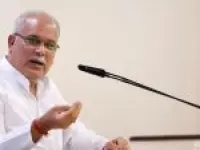
All You Need To Know About BR Gavai, The Incoming Chief Justice Of India
New Delhi: Justice Bhushan Ramkrishna Gavai or BR Gavai, recently hit headlines with his strong judgement on the demolitions of the properties including houses of the accused, is all set to take charge as the 52nd Chief Justice of India next month, on May 14. A judge with firm beliefs and principles, Justice Gavai’s social commitment was manifested last month when he, along with a team of Supreme Court judges, traveled to Manipur and personally interacted with the victims of the lingering ethnic conflict.
Amid attacks against the supreme court and particularly the current chief justice on verdicts regarding the Waqf Amendment Act and allegations of corruption against a former Delhi High Court judge Justice Yeshwant Varma, the country is eagerly looking at the incoming chief justice. The discovery of huge cash in Justice Varma’s residence and his following transfer to the Allahabad High Court had cast shadow over the transparency of the judiciary.
Read Also: Supreme Court Judges To Declare Their Assets Public, Here’s Why
Current Chief Justice Sanjiv Khanna recently recommended Justice B R Gavai to the Union Law Ministry as the next Chief Justice, as his tenure is going to end on the 13th of next month. The recommendation will be for a tenure of around six months till his retirement on November this year.
Born in Amravati in Maharashtra in 1960, Justice Gavai began his legal career in 1985, working with senior lawyer Raja S Bhonsale. Gavai started his independent law practice in 1987 at the Bombay High Court. He has drawn inspiration from the constitution architect Dr BR Ambedkar. Justice Gavai’s father, Ramakrishna Suryabhan, a prominent leader of Ambedkar movement, was a former parliamentarian and governor of Kerala and Bihar.
Read Also: 14,92,586 Cases Pending In Fast-Track Courts; UP Tops The List
Specialised in constitutional and administrative law, Justice B.R. Gavai is currently the second-most senior Supreme Court judge and is set to become the second Dalit chief justice of India after Justice K.G. Balakrishnan, who took the position in 2007.
It was in 2003 Gavai ascended to the position of law lord as he was appointed as an additional judge of the Bombay High Court. In May 2019, Justice Gavai was elevated to the Supreme Court of India.
Notably, while serving in the top court, Justice Gavai has been part of some of the key judgements, which include the upholding of the 2016 demonetization and abrogation of Article 370. He was also part of the Constitution Bench that struck down the Electoral Bonds Scheme in the case between Association for Democratic Reforms and Union of India.
Justice Gavai’s judgement against the demolition of houses of people accused of crimes by various state governments went viral on social media. During a hearing in November last year, Justice Gavai opened his judgement with a poem by Hindi poet Pradeep. “To have one’s own home, one’s own courtyard—this dream lives in every heart. “It is a longing that never fades, to never lose the dream of a home,” Justice Gavai quoted Pradeep while highlighting the importance of shelter for every individual and their families under their heads.
However, the public has so far seen Justice Gavai as the one who does not mince his words in the Court, delivering momentous judgements with a firm hand.












